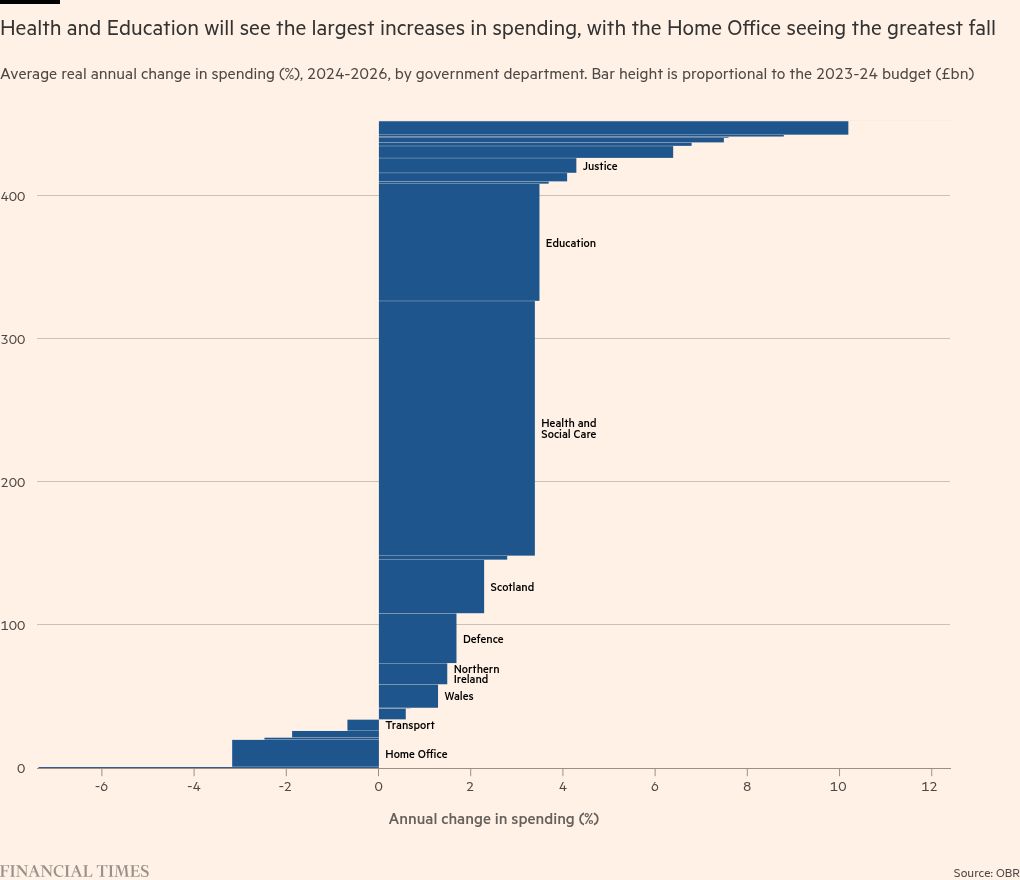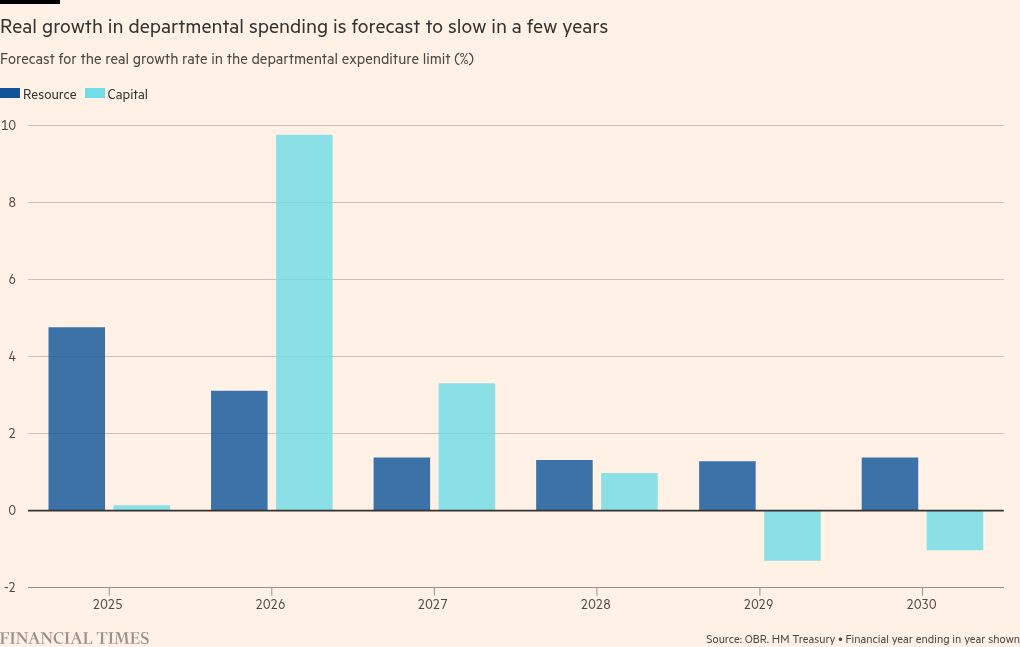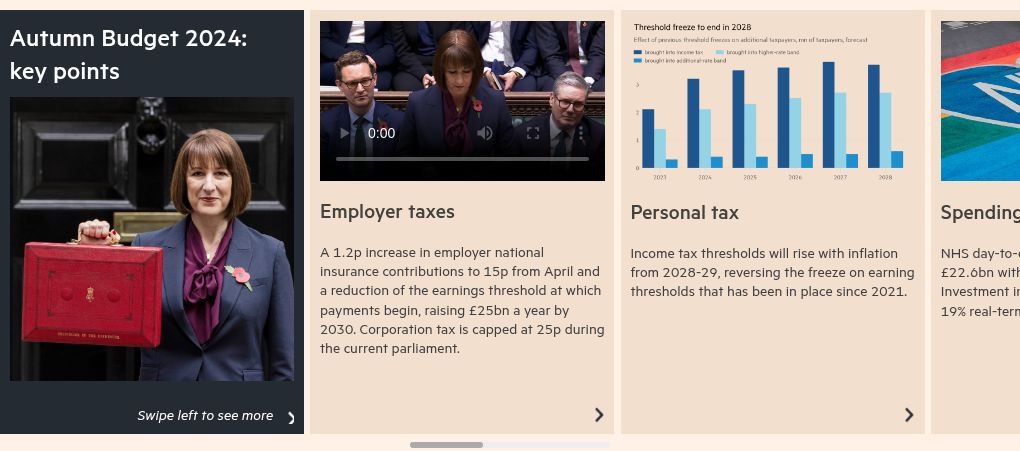
Britain’s public services are set for a huge near-terms cash boost that will fade towards the end of the decade, as Rachel Reeves prioritised hospitals and schools with tens of billions of pounds of new funding.
The UK chancellor on Wednesday announced a £22.6bn rise in the day-to-day budget of the NHS over two years and a £3.1bn increase in its capital budget — in what she said was the biggest sum of money since before 2010, outside of the pandemic.
There were also generous settlements for other favoured priorities: an extra £1bn for special needs education, a £500mn boost for affordable housing, £1.3bn in core local government funding, including £600mn for social care, and no cut to the £20.4bn science & innovation budget.
But three other “unprotected” Whitehall departments have been handed real-terms cuts to their budgets over an initial two years: the Cabinet Office, the Home Office and the Department for Transport.
Overall, Reeves is spending heavily in the short term, but the government anticipates a much tighter squeeze later in the parliament, so that it can still achieve its “golden rule” about day-to-day spending being met by tax revenues.
Total departmental spending is increasing in real-terms by 3.9 per cent in this financial year and 4.3 per cent in the next, but sharply drops afterwards.
By 2028-29 and 2029-30, the real-terms increases will be 0.8 per cent and 0.9 per cent respectively, according to the Office for Budget Responsibility, the fiscal watchdog.
The government has committed to meeting its golden rule by 2029-30, but whether it will be politically palatable to follow through on the squeeze remains unclear.
Ben Zaranko, senior research economist at the Institute for Fiscal Studies think-tank, said the government had “massively front-loaded big increases in spending albeit not across the board”.
“But after the first couple of years you see numbers that are broadly more in line with what [former Conservative chancellor] Jeremy Hunt planned — these are short-term spending injections,” he added.

The OBR said there would be less belt-tightening than under plans set out by the previous Conservative government, but unprotected departments are forecast to be hit with real-terms cuts later in this parliament.
The government has promised to ringfence health, defence, pensions and schools funding, leaving other areas more vulnerable.
After a big cash injection this year, the budgets of non-ringfenced departments fall by an average of 1.1 per cent a year in real terms between 2025-26 and 2028-29. The decrease is less than the 2.3 per cent equivalent annual fall expected under Tory plans but will still require difficult political decisions ahead.
Reeves’ additional £22.6bn for NHS day-to-day spending over two years means a real-terms growth rate of 3.8 per cent from 2023-24 to 2025-26.
The chancellor told MPs that the £3.1bn capital injection would help address the backlog of repairs and upgrades across the NHS estate, provide new beds in hospital, new diagnostic centres and tackle old crumbling hospitals.
The government has previously said the NHS would receive “no more money without reform”, and Reeves said in her speech that the NHS would need to find 2 per cent productivity growth next year — a target handed to all government departments.
Saffron Cordery, deputy chief executive of NHS Providers, which represents health organisations across England, said the capital settlement provided a “welcome boost” but that more was needed to “plug a rocketing backlog of NHS repairs” that had reached almost £14bn.

Day-to-day spending on education will rise by 3.5 per cent, or £2.3bn, over the two-year period, Reeves said, as she also announced £1.4bn to rebuild 500 schools “in the greatest need”.
A further £2.1bn will go towards improving school maintenance — an increase of £300mn on this year — but the additional cash comes after a decade of underfunding for schools maintenance budgets.
Daniel Kebede, general secretary of the National Education Union, said the additional funding was welcome but fell “short of what is needed to rebuild education”.
The transport department faces a 2.5 per cent drop in departmental spending.
Budget documents said the shortfall reflected expectations that the rail industry would need less public subsidy as the industry recovered from Covid and more passengers travelled. But some rail executives said they expected real term funding cuts in the next financial year.
There were big cuts to the UK Shared Prosperity Fund — a post-Brexit version of the EU structural funding — from £1.5bn this financial year to £900mn next year.
Documents published alongside the Budget showed ministers were also “minded” to cancel “levelling up” culture and capital projects, such as museums and libraries, which were yet to have had cash officially allocated.
The Home Office will cut spending plans on its asylum system by £4bn, in part through scrapping the Rwanda removal scheme, a challenging target given that the department has so far struggled to reduce its reliance on asylum hotels
Reeves announced an extra £2.9bn for defence to ensure the UK “comfortably exceeds” the Nato minimum expenditure target of 2 per cent of GDP. The extra cash means the Ministry of Defence’s budget grows by 2.3 per cent in real terms over the next two years.

The Treasury is slashing the UK’s overseas aid expenditure next year, after Reeves resisted a plea from foreign secretary David Lammy to match Tory-era top ups to international development funding in order to offset the share — almost 30 per cent — that is spent on supporting asylum seekers in the UK.
There will be an extra £500mn for the long-running Affordable Homes Programme, which allocates money to housing authorities and councils to build new homes. Housing associations welcomed the extra cash and the promise of a five-year rent settlement at headline inflation plus 1 per cent, although some said there should be a longer 10-year agreement.
The government said it would maintain research and development investments for 2025-26 at £20.4bn — a decision Sir Adrian Smith, president of the Royal Society, described as “very good news”.
Data visualisation by Amy Borrett